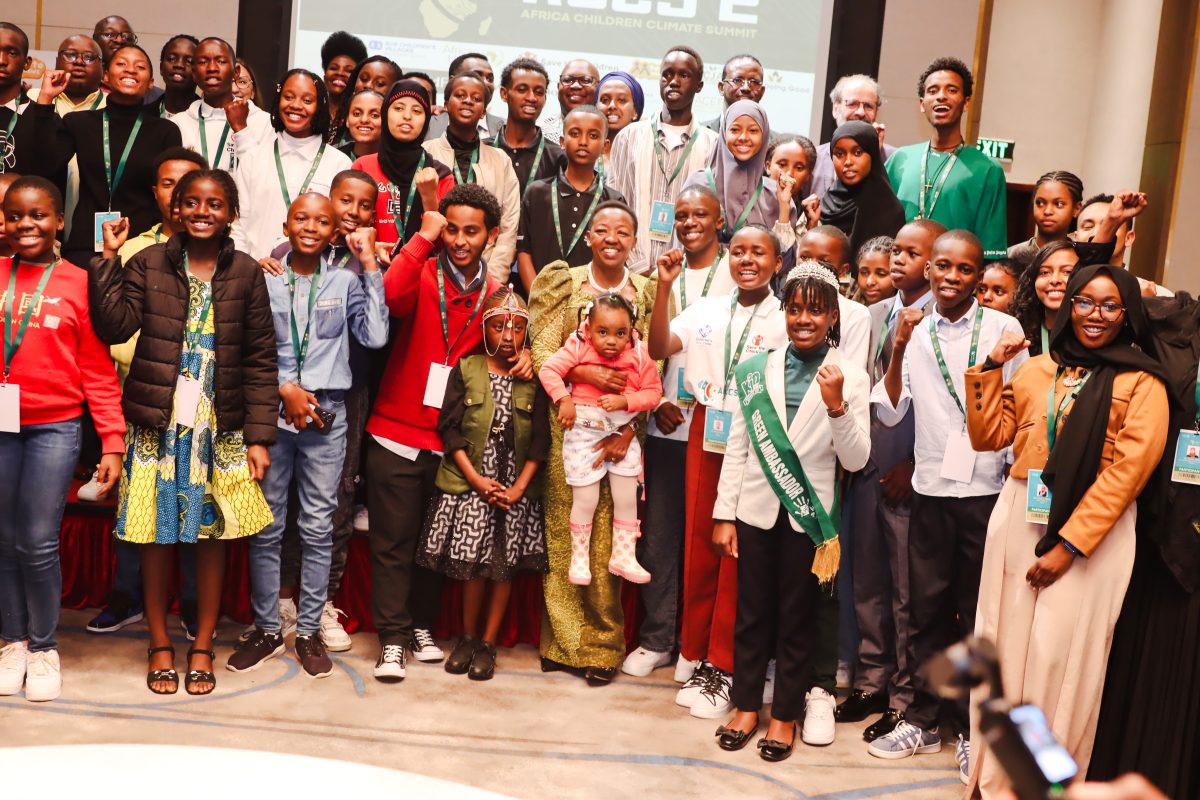Written by Alice Njoki
Ethiopia, September 7, 2025 — Children and youth from across Africa gathered in Ethiopia for the African Children Climate Summit 2 (ACCS2), where they unveiled the African Children’s Climate Declaration. The one-day summit, held after a series of pre-summits in African Union member states, showcased young people’s leadership in the climate movement and set out a clear call for urgent, inclusive and rights-based climate action that protects children’s well-being and future.
Children across Africa account for the second largest majority of the population, and yet they are always left behind. Climate change is not just an environmental issue but is also a children’s rights emergency.
It disrupts children’s education and threatens their lives, from the ones in rural areas, informal settlements and those with disabilities.
‘We, the children and youth of Africa, demand urgent action that safeguards food security, promotes sustainable agriculture, ensures access to clean water and sanitation, guarantees healthcare, and protects against devastating climate-related disasters.’
During the summit, the children’s participants openly shared their lived experiences with challenges that they have encountered in their day-to-day life including flooding, rampant plastic pollution, inadequate waste management, deforestation, limited climate education and insufficient infrastructure resilience.
They urgently called for improved climate education and emphasized on practical, hands-on learning that empowers children to act as protectors and innovators for their communities.
Key demands articulated by the children include:
- Inclusive representation: Ensuring at least 30% of climate decision-making bodies are children and youth including those from rural, marginalized, and differently-abled backgrounds to authentically reflect their voices.
- Access and comprehension: Climate policies must be translated into children’s native languages to guarantee meaningful understanding and participation.
- Climate-resilient infrastructure: Schools and healthcare facilities should be equipped with renewable energy solutions, water-saving technologies, and heat-resistant materials to withstand climatic extremes.
- Food security and nutrition: Expansion of school feeding programs with climate-smart, nourishing meals, alongside promotion of school gardens and climate-aware agricultural training.
- Clean water and sanitation: Assurance of safe water and adequate menstrual health facilities in all schools to curb disease and support education.
- Sustainable energy and innovation: Prioritizing solar power and energy-efficient technologies in rural and urban schools, investing in green innovation led by youth.
- Education and empowerment: Integrating climate literacy and climate justice in curricula, backing teacher training, and fostering green job skills through fellowships and internships.
- Youth-led monitoring and accountability: Establishment of digital platforms to track progress, ensuring climate promises translate into concrete actions.
- Funding and support for youth initiatives: Allocation of national and international climate finance to child-led projects, emphasizing grassroots activism, tree planting, and arts-based campaigns.
- Mental health support: Providing counseling to address climate anxiety and trauma among children and youth.
- Focus on vulnerable groups: Prioritizing the needs of socio-economically disadvantaged children, children with disabilities, and those living in high-risk areas.
Throughout the sessions, young leaders highlighted their unwavering commitment to transforming fear into hope through knowledge, unity, and collaboration with policymakers and communities. They emphasized that their roles extend beyond victims of climate change; they are innovators, solution providers, and drivers of Africa’s sustainable future.
The First Lady of Kenya, Rachel Ruto, reinforced these views, declaring that climate change is not a distant threat but an immediate and lived reality for Africans today. She celebrated the African Children’s Climate Declaration as a vital roadmap addressing pressing issues such as food security, sustainable agriculture, health care, clean water, sanitation and protection from climate disasters.
‘Children are powerful agents of change right now, not merely future leaders.’ She said,
She called on governments, communities, and global forums like the United Nations to listen genuinely and ensure children have a meaningful seat at all decision-making tables, from schools to parliaments to international stages.
The First Lady affirmed her personal commitment to amplifying children’s voices and championing their rights, urging collective action that transforms anxiety into empowerment. Her message resonated deeply with the summit attendees, reinforcing the call for a resilient and climate-smart Africa built on children’s active participation.
So, as we get into the African Climate Summit 2 ( ACS2) starting on 8th-10th of September 2025, the inspiring leadership of African children and youths are calling for genuine partnership and trust rather than charity positioning themselves as essential architects of Africa’s sustainable and equitable future.

